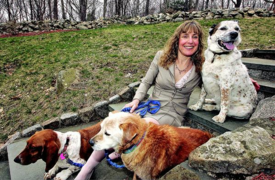animal law
April 17, 2008
Making Puppy Mills History
by Nancy White (http://www.wickedlocal.com - April 17, 2008)
 Deborah Howard sits with three of her 4 dogs. Photo: Robin Chan
Deborah Howard sits with three of her 4 dogs. Photo: Robin Chan
Cohasset - A tiny yellow lab in a pet shop window changed Deborah Howard’s life. After seeing his open wound pressed up against a wire cage, she looked around the store. Cramped cages, unsanitary conditions and visibly sick animals were what she saw in the Docktor Pet Center pet shop in Atlanta in 1989.
When she held the yellow lab, she wondered about where he and the other puppies came from. When she found out they came from “puppy mills,” commercial breeding facilities that mass produce dogs for resale, she knew she had to do something.
Twenty years later the Cohasset resident has had some successes, but is still battling the puppy mill and pet shops issue full force across the US on multiple fronts. As president and founder of the Companion Animal Protection Society (CAPS), her foremost concern is pet shops and puppy mills. CAPS is the only national non-profit dedicated Shortly after her experience in the Docktor Pet Center pet shop in 1989, she formed the non-profit exclusively to protecting companion animals — the politically correct way of saying pets, like dogs and cats.
After her experience at Docktor Pet Centers, Howard almost immediately began to take action. She brought the story to “20/20” and gathered video and document evidence to expose the horrific conditions. After the “20/20” special, numerous protests and feature articles in national magazines, Docktor Pet Centers declared bankruptcy in 1993.
But, Howard’s work didn’t stop there. Since becoming a non-profit in 1992, CAPS has investigated over 1000 pet shops and puppy mills. Investigators work undercover to gather evidence to bring forward to state and federal legislatures who are supposed to be overseeing the industry.
Puppy mills fall under the US Department of Agriculture (USDA) and although Howard says regulation is in the books, the laws are not being enforced. Sometimes CAPS investigators collect evidence of numerous violations — days after a federal inspection issues a report listing no violations.
“There needs to be a lot more USDA oversight. If they were really doing their job, a lot of puppy mills would not exist,” she says. Even when violations are found, Howard says there is very little follow up or consequence and the site can continue to operate as it is.
“Our specialty is investigation, we have outstanding undercover agents,” says Howard. Bringing to light the existing situation and educating the public is one of the key components of CAPS efforts.
Howard says pet stores bank on the impulse buyers who are drawn in by the adorable puppies on display. Pet stores typically do not ask questions about the buyer’s home environment to determine if the home is appropriate for raising a puppy. Educating the public to know about the background about pet shops before they go into a pet store is essential. Through their websites (www.caps-web.org, www.caps2point0.org), educational materials, media relations, legislative involvement, consumer assistance, CAPS is constantly battling the pet shop industry.
Howard says there is a growing number of young people, sometimes still in college, buying puppies from pet stores. Even more disturbing, she says is the birth of “designer dogs,” basically what she describes as mixed-breed dogs.
“It breaks my heart to know dogs are being thought of as fashion items,” says Howard. “Dogs should be a member of the family and be provided with a good life, it should not be there because the owner wants to make a fashion statement.”
Every year more than a half-million purebred puppies, destined for pet shops across the United States and Canada are born in crowded and usually squalid conditions at Midwest, New York and Pennsylvania puppy mills, says Howard.
“A puppy mill could be a clean facility (most are not), but it is still a commercial livestock operation, they are not raising dogs in the warmth of a home,” says Howard.
After years of fighting the puppy mill industry, Howard says a new facet to the same problem has cropped up — the internet breeder.
“Now, a lot of what we are seeing is internet sales,” says Howard, buyers are purchasing puppies sight unseen from an internet website. Many internet breeders are the same puppy mills pet shops get their dogs from. Other internet breeders are completely unregulated and the buyer has very little recourse if the dog arrives sick or later develops health problems, says Howard.
Foremost, Howard says people need to stop buying dogs from pet stores or online and educate everyone they know about puppy mills and pet stores.
“Don’t buy a pet store dog, go to a shelter. Go to www.petfinder.com. It’s doesn’t make a lot of sense to buy a dog when there are millions of unwanted dogs and cats in shelters,” says Howard, who has four dogs and two cats, all rescue animals. “Rescue animals make wonderful pets.”
In addition, as a non-profit CAPS constantly needs financial assistance. “It’s not cheap doing investigations,” says Howard, from equipment to travel expenses. Often, CAPS rescues puppy mill dogs as well and incurs veterinary expenses.
People can become a member of CAPS, currently there are 4100 CAPS members nationwide.
To receive our emails, fill in your email and click join. Thanks, and welcome!









